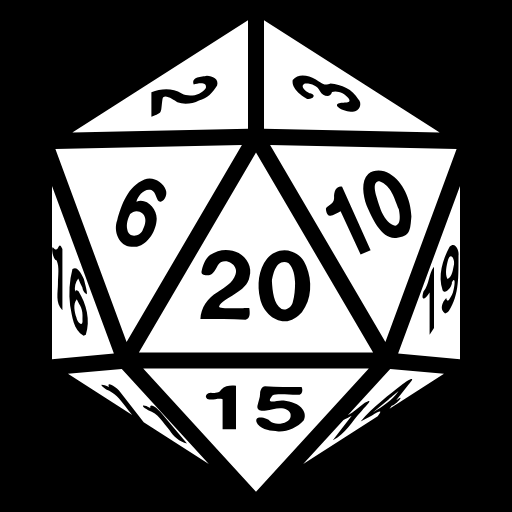D20 (PSR Supplement)
From D&D Wiki
|
Other Dangers |
When the outcome of a protag’s effort is uncertain, the player rolls a twenty-sided die, called a d20. The rolled result is compared against a number—called the mark—which is specified by the narrator. If the result equals or exceeds the mark, the effort is a success. Otherwise, it’s a failure.
The game classifies d20 rolls into three categories. Often, one effect or another will only apply to one category.
- An attack roll, or “attack,” is made to land a hit on a creature or object. Throwing a ball at a stationary target is an attack roll, for example.
- A saving throw throw, or “save,” is for a defensive effort to reduce or avoid harm. This might for example be made to resist a poison, notice a threat, or take cover from an explosion.
- An ability check, or “check,” includes any other d20 roll you make.
There's a few key factors that might affect the outcome of your d20 roll, detailed below.
- Whenever you roll a d20, you always add an ability modifier to the result.
- You often add your proficiency bonus, or "PB."
- Sometimes your d20 roll will have advantage or disadvantage.
- Sometimes an effect will add expert dice to the d20 roll.
- Rarely, a feature will let you reroll the d20.
Ability Modifiers
Each creature has six ability modifiers that represent its physical and mental talents: Strength, Dexterity, Constitution, Knowledge, Perception, and Charisma. Each of these abilities is further detailed later.
An ability modifier typically ranges from as low as -5 to as high as +5. The ability most relevant to the effort has its modifier added to the d20 result. For example, shoving open a stuck door would use Strength. So, if your protag was trying to shove open a stuck door, you would roll a d20 and add your Strength modifier to the result, then compare this total to a mark specified by your narrator.
PB: Proficiency Bonus
Every creature has a proficiency bonus, typically called PB. As a protag your PB is initially +2, but this can increase later.
Proficient. If you're "proficient" or "have proficiency" with an item or skill vital to the effort represented by a d20 roll, you also add your PB to the d20's result. You don't normally add your PB more than once to a roll, even if multiple proficiencies apply to the effort.
Sometimes being proficient with an item provides other benefits, such as increasing the effectiveness of a shield.
Aside from proficiency your PB affects some other features, such as your Defense and how many attunements you can have at once.
Advantage & Disadvantage
Sometimes a game effect imposes advantage or disadvantage on a specific d20 roll. When that happens, you roll a second d20 when you make the roll. Use the higher of the two rolls if you have advantage, and use the lower roll if you have disadvantage.
Example: If you have disadvantage and roll a 18 and 4, you use 4. If you had advantage, you would instead use 18.
(Dis)advantage Doesn't Stack. If multiple situations affect a roll and each one grants advantage or imposes disadvantage on it, you don’t roll more than one additional d20. If two favorable situations grant advantage, for example, you still roll only one additional d20.
They Completely Negate Each Other. If circumstances cause a roll to have both advantage and disadvantage, you are considered to have neither of them, and you roll one d20. This is true even if multiple circumstances impose disadvantage and only one grants advantage or vice versa. In such a situation, you have neither advantage or disadvantage.
Expert Dice
Some game effects will let you add expert dice to specific d20 rolls. For example, while in a rage you add a d4 expert die to all ability checks, saving throws, and damage rolls that add your Strength modifier.
You roll the expert die alongside the d20, and add the expert die’s result to the total for the d20 roll.
This effect is sometimes called expert damage when it applies to a damage roll, but the same rules apply.
Expert Dice Don't Stack. If you have multiple effects which grant expert dice to the same roll, the dice don’t combine. You choose only one effect’s expert dice to add to the roll.
Reroll
Some effects let you reroll the d20 or another die. When you do so, you roll the die again and use the new result if it is higher. You don't reroll any expert dice.
If multiple effects let you reroll dice, they don't stack. Once a die has been cast, you can reroll it no more than once.
For a d20 roll with advantage or disadvantage, you choose only one of the d20s to reroll. You can't reroll both dice.
Other Dice
Just like a 20-sided die is called a d20, the game occasionally uses other polyhedral dice: d12, d10, d8, d6, and d4.
A special case is the d100, or percentile dice. For these you roll a d10 for one of the digits, and a second d10 for the other digit. For example if the first d10 lands on a 9 and the second d10 lands on a 3, the result is 93.
Abbreviations are used to roll multiple dice. For example, rolling 2d6 means rolling two six-sided dice, and summing their face numbers for the result.
(Dis)advantage. Sometimes a game effect imposes advantage or disadvantage on other rolls other than a d20, such as for damage rolls. In such a case the same rules of (dis)advantage apply. Unless stated otherwise this effect applies to all the dice; rolling 2d6 with advantage for example means re-rolling both dice, not only one of them.

